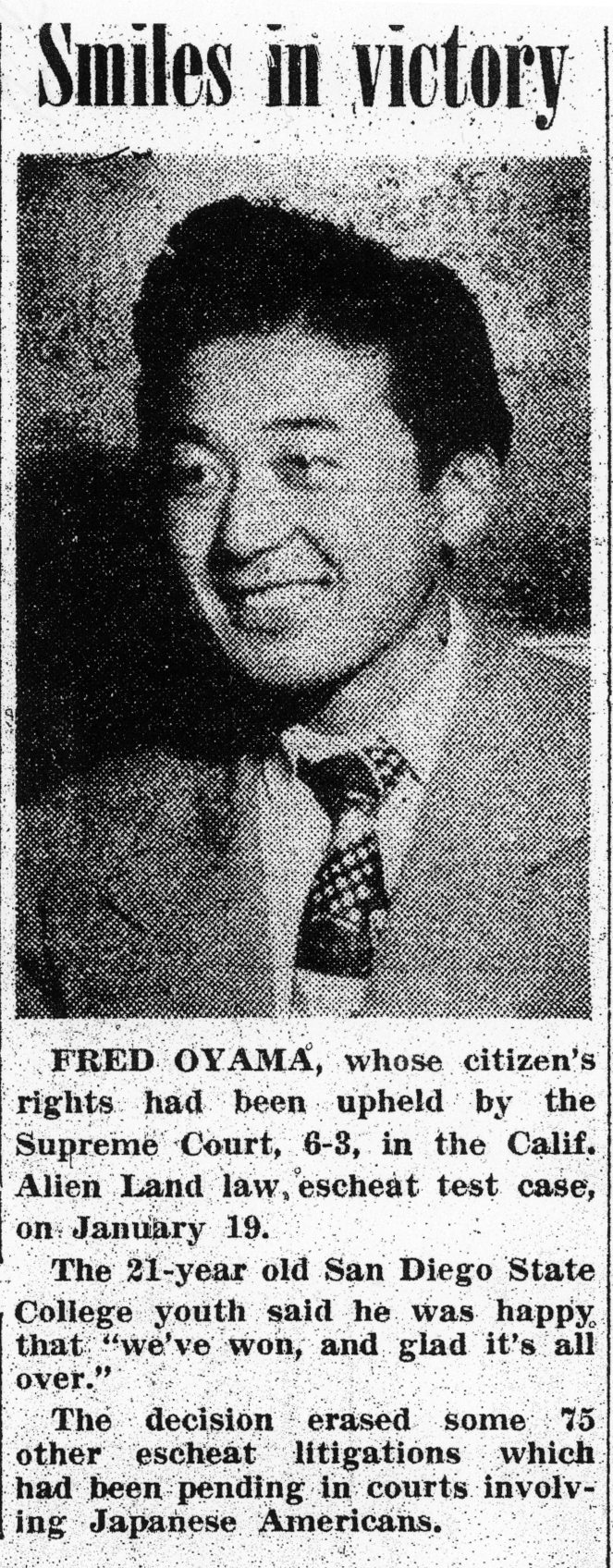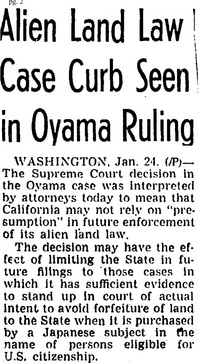
Smiles in Victory, 1948, ACLU San Diego
With the aid of the JACL and the ACLU, Wirin decided to appeal to the United States Supreme Court. The case had five opinions, the majority opinion, the concurring opinion, and the dissenting opinion.
The majority opinion agreed with the first charge.
“We agree, with petitioners' first contention, that the Alien Land Law, as applied in this case, deprives Fred Oyama of the equal protection of California's laws and of his privileges as an American citizen. In our view of the case, the State has discriminated against Fred Oyama; the discrimination is based solely on his parents' country of origin; and there is absent the compelling justification which would be needed to sustain discrimination of that nature."
~ Chief Justice Vinson, majority opinion
The concurring opinion addressed the equal protection argument of Kajiro Oyama and stated that the Alien Land Law constituted a violation of the Equal Protection Clause of the Fourteenth Amendment.
“To me the controlling issue in this case is whether the California Alien Land Law on its face is consistent with the Constitution of the United States. Can a state prohibit all aliens ineligible for American citizenship from acquiring, owning, occupying, enjoying, leasing or transferring agricultural land? Does such a prohibition square with the language of the Fourteenth Amendment that no state shall "deny to any person within its jurisdiction the equal protection of the laws”?”
~ Justice Murphy with Justice Rutledge, concurring opinion
Finally, the dissenting opinion found that the Alien Land Law didn’t violate equal protection principles.
“I am unable to see how this Court logically can set aside this judgment unless it is prepared to invalidate the California Alien Land Laws, on which it is based. If this judgment of escheat seems harsh as to the Oyamas, it is only because it faithfully carries out a legislative policy, the validity of which this Court does not question.”
~ Justice Jackson, dissenting opinion
In January 1948, the U.S. Supreme Court reversed the initial court’s decision and ruled that the Oyamas could keep their land, cracking the barrier preventing land ownership but it didn’t address the racial discrimination towards Japanese noncitizens.

Smiles in Victory, 1948, ACLU San Diego

L.A. Times, January 25, 1948, KCET
Though the Oyamas were victorious and were able to take back ownership of their property, the Alien Land Law still posed a barrier faced by many Japanese-Americans wanting to own land. While Japanese-American citizens could own land, Japanese noncitizens couldn’t because the decision recognized equality in property rights as a privilege of U.S. citizens and not an individual guarantee in the Fourteenth Amendment. Allowing racial discriminatory property laws against Japanese noncitizens to continue because the equal protection claim of Kajiro Oyama wasn’t addressed.